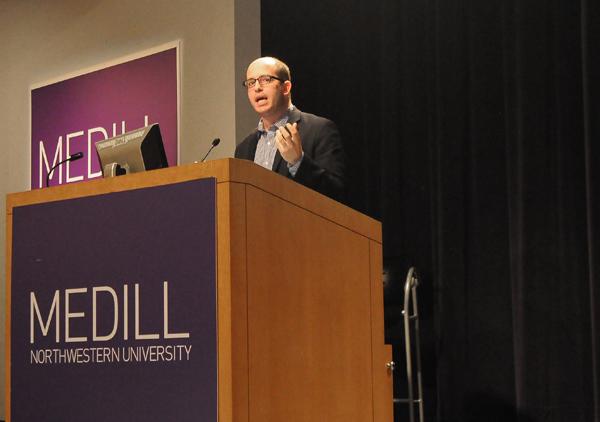
New York Times media reporter Brian Stelter was the keynote speaker Saturday at Media Rewired, a new conference on digital storytelling put on by the Medill Undergraduate Student Advisory Council. After his speech, the 27-year-old Stelter spoke to The Daily about journalism as a business model, getting along with Times veterans and his upcoming book on morning television titled “Top of the Morning,” which comes out April 23.
On how journalism schools fit into the future of media: “People say it’s irrelevant, but I don’t think it is. I think journalism school can be and maybe should be a four-year laboratory for the skills of journalism and for the future services and products of journalism — to come up with those products, to come up with those personal, professional brands. Maybe ‘incubator’ would be the right word. … And I get a sense that these schools slowly are adapting and becoming more like laboratories and encouraging experimentation. That’s not to say that every student will actually do it, but at least the schools are encouraging it.”
On The New York Times’ social media policy: “What there is is an awareness of the Times’ policy, which is two paragraphs long. What boils down to is, ‘Don’t be stupid.’ And I love that. I’m so glad that we haven’t tried to be draconian. We haven’t tried to stifle creativity. We’ve just said, ‘Don’t be an idiot.’ And I like that because I actually think to myself, ‘Is this tweet stupid?’ And sometimes I don’t tweet it for that reason, honestly. And then every six months or so, although it hasn’t happened in like a year, I will tweet something stupid, and my editor will call me into his office, and he’ll say, ‘Well, that was stupid.’ And I’ll agree, and we’ll talk about why, and I’ll apologize, and we’ll be back there in six months. (laughs) To me, that’s a very comfortable, healthy way to do it. They don’t prescreen tweets or Facebook posts or anything else, but they pay attention, and if something’s a problem, they’ll bring it up.“
On journalism as a business model and paywalls: “It seems that most of the subscriber walls that we’ve seen thus far have been purposely porous so that people can read some articles for free. I think that’s a more comfortable model and a more generous one. Television news is pretty much free overall. There are free sources of news. But that’s an interesting issue. The Washington Post announced a paywall recently but said it would remain free in the city and in the neighborhoods.”
On being a young journalist in an office with older journalists: “When I mentioned hostility, it was never open. I just think there’s a tendency amongst some older reporters to bristle at younger reporters who they view as competitors. I think it’s incumbent upon younger reporters to make clear that’s not the case. What younger journalists have to indicate is that we’re not here stealing your jobs. We’re here to help. We’re here to learn from you. In many cases, younger journalists have more to learn than they have to teach. But it’s good that we can teach.”
On his upcoming book, “Top of the Morning”: “I think it’s interesting the publisher won’t let me talk about it. They won’t let me talk about what’s in the book until the date of release. There’s an excerpt that comes out next week that has some of my best material. The contours of the story have been told. What I hope people buy the book for is a story about two rival shows and what it’s like to produce the shows and what it’s like to anchor the shows. I don’t think people are going to buy it for scoops. I think they’re going to buy it to read a story. That’s the way I wrote it. I’m actually trying to lower expectations because there’s all this hype online.”















